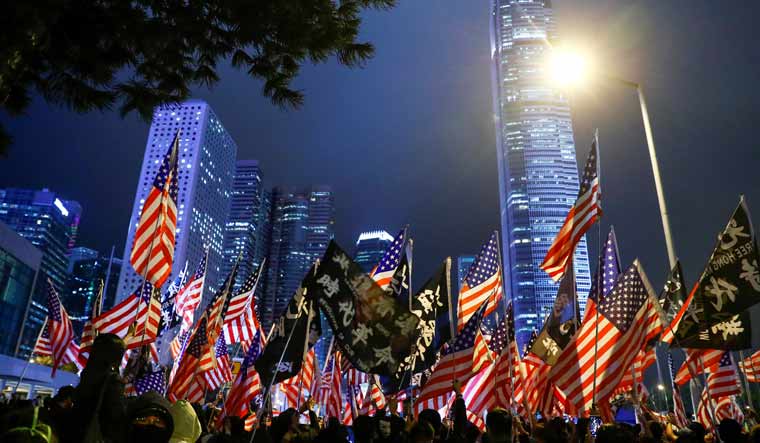On Thanksgiving evening, thousands gathered in Hong Kong on Thursday to celebrate US President Donald Trump’s signing of a bill that would force a US review of the city’s special trading status on account of its declining autonomy with respect to China.
Many waved the American flag and sang the ‘Star-Spangled Banner’ as three approved rallies took place simultaneously in the city.
Activist Nathan Law called the bill a ‘thanksgiving present’ to the people of Hong Kong, one that was celebrated as a ‘bitter victory amid the prolonged movement.’ He said the bill encourages the Hong Kong people to keep fighting for democracy.
The Hong Kong Human Rights and Democracy Act was signed into law on Wednesday, days after it received assent from both the House of Congress and the Senate. “I signed these bills out of respect for President Xi, China, and the people of Hong Kong. They are being enacted in the hope that leaders and representatives of China and Hong Kong will be able to amicably settle their differences leading to long term peace and prosperity for all.”
The move sparked fury from China, who vociferously opposed US involvement in the region, warning of countermeasures and summoning the US envoy to protests, asking Washington to refrain from putting the law into effect to “avoid further damage” to bilateral ties.
The bill would require the State Department to certify once a year that Hong Kong is sufficiently autonomous to retain its special US trading consideration—a status that helps its economy.
Chinese Vice Foreign Minister Le Yucheng summoned US Ambassador to China Terry Branstad to lodge a strong protest against the US move.
"China strongly urges the US to correct its mistake and make a fresh start, not to put the Act into effect, and immediately stop meddling in Hong Kong affairs or interfering in China's internal affairs so as to avoid causing further damage to bilateral ties and cooperation in important areas between China and the United States," Le told Branstad.
He said the Chinese government and the people express strong indignation and firm opposition against Trump's action.
Hong Kong is part of China and its affairs are China's internal affairs, brooking no interference from any foreign government or force, Le said.
The Chinese government has unswerving determination to defend national sovereignty, security and development interests, implement "one country, two systems" principle and oppose any external force in interfering in Hong Kong affairs, he stressed.
Earlier, a Chinese Foreign Ministry statement accused the US of harbouring "sinister intentions" and warned of "countermeasures" after Trump signed the bill.
"This is a severe interference in Hong Kong's affairs, which are China's internal affairs. It is also in serious violation of international law and basic norms governing international relations. The Chinese government and people firmly oppose such stark hegemonic acts," the statement said.
"The nature of this is extremely abominable, and harbours absolutely sinister intentions," it said.
"This act will only further expose the malicious and hegemonic nature of US intentions to the Chinese people, including our Hong Kong compatriots. And the Chinese people will only stand in greater solidarity. The US attempts are bound to fail," it said.
But at the same time, it sought to reassure that China would implement the 'one country two systems' formula under which Hong Kong was handed over to China by Britain in 1997.
Hong Kong is a semi-autonomous territory which operates under the 'one country, two systems' principle—a structure that grants the city's citizens some degree of financial and legal independence from the mainland.
Hong Kong has been shaken by massive, sometimes violent, protests initially organised to oppose a now-suspended bill that would have allowed extraditions to mainland China. These protests have now turned into a wider movement for democratic reforms.
The aftermath of the bill was a sharp dip in global markets, over fears that the signing of the bill would derail ongoing negotiations for a trade-deal.
The US and China have been embroiled in bitter trade wars since Trump took office, leading to billions of dollars of lost revenue in exports for both countries.
With inputs from PTI



